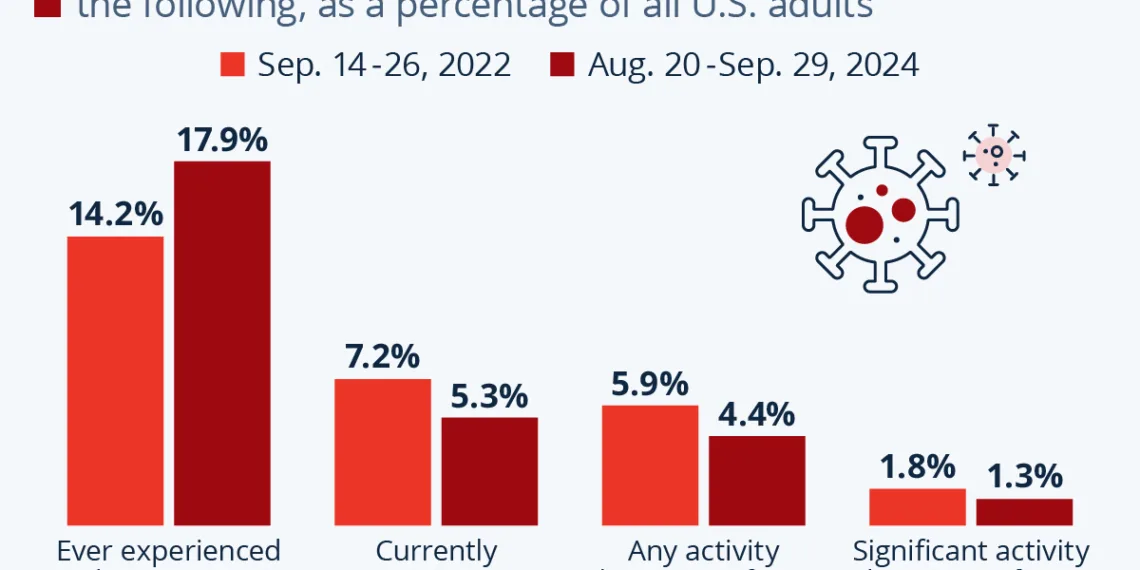Select Language:
Understanding Long Covid: The Lingering Effects of the Pandemic
The Ongoing Impact of Long Covid
As we reflect on the journey since the World Health Organization declared a global pandemic due to COVID-19 five years ago, it becomes clear that the effects of the virus extend beyond just initial illness. While widespread vaccination has dramatically reduced hospitalizations and fatalities, a significant number of individuals continue to grapple with the long-term repercussions of COVID-19, commonly referred to as long Covid.
What is Long Covid?
Long Covid encompasses a range of symptoms that persist for weeks or months after the initial infection has resolved. These symptoms can manifest in various ways, affecting multiple organ systems and often severely impeding daily activities. Commonly reported issues include fatigue, cognitive dysfunction, shortness of breath, and joint pain, but the experiences vary widely among individuals.
Long Covid Statistics: A Closer Look
Prevalence Among Adults
Recent data from the Centers for Disease Control and Prevention (CDC) has revealed alarming statistics regarding the prevalence of long Covid in the United States. According to a representative survey conducted between August 20 and September 2024, nearly one in five adults—or 17.9 percent—reported having experienced long Covid at some point. This figure marks an increase from 14.2 percent recorded in a previous survey conducted in September 2022, indicating that even years after the onset of the pandemic, the effects of the virus remain significant.
Current Experience of Long Covid
While the overall awareness of long Covid has grown, the proportion of individuals currently suffering from this condition has shown a decline over time. As of last summer, 5.3 percent of the U.S. population indicated they were currently experiencing long Covid symptoms, a drop from 7.2 percent in 2022. This trend suggests a gradual decrease in new long Covid cases as time progresses, potentially as a result of improved treatments and increased societal immunity.
Activity Limitations Due to Long Covid
The Impact on Daily Life
The repercussions of long Covid extend beyond mere physical symptoms; they significantly affect the quality of life and daily functioning of those impacted. According to the CDC, a considerable portion of the population has faced activity limitations as a result of long Covid. The numbers may appear low in percentage terms, with 4.4 percent of U.S. adults reporting such limitations. However, this translates to over 15 million individuals who are struggling to perform everyday tasks due to persistent health issues associated with long Covid.
Psychological Effects
In addition to physical limitations, many individuals with long Covid also encounter psychological challenges, including anxiety, depression, and cognitive difficulties often described as "brain fog." The interaction between physical and mental health complicates the recovery process, creating a multifaceted issue that requires a comprehensive approach to treatment and support.
Historical Context: Evolution of Long Covid Awareness
Initial Findings
The understanding of long Covid has evolved rapidly since the onset of the pandemic. Initially, the focus was primarily on acute COVID-19 cases; however, as healthcare providers began observing persistent symptoms in patients long after their recovery, the medical community quickly acknowledged the need to address this new phenomenon.
Research Developments
Subsequent research has devoted significant attention to identifying the causes of long Covid, its symptoms, and potential recovery pathways. Multidisciplinary studies are crucial as they investigate the long-term health impacts of COVID-19 and seek to provide evidence-based interventions for those suffering from long Covid.
The Future of Long Covid Awareness and Treatment
As the understanding of long Covid continues to grow, there is hope for improved treatment options and support systems. The emphasis on research and patient advocacy is vital to address the ongoing needs of those affected. As more data becomes available and the medical community learns from patient experiences, there is potential to develop tailored strategies to help manage and alleviate the symptoms associated with long Covid.
Summary of Key Points
- Long Covid remains a critical public health issue, affecting nearly one in five U.S. adults.
- Although the prevalence of currently experiencing long Covid symptoms has decreased, millions still face significant health challenges.
- The ongoing impact of long Covid highlights the importance of continued research and support for affected individuals.
By investigating the current landscape of long Covid, we gain insight into the intricacies of its impact on society. Understanding the experiences of those affected by the condition is essential in fostering empathy and driving progress toward effective solutions.







